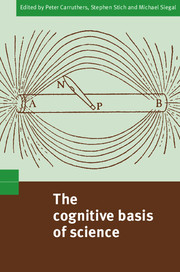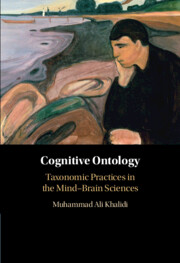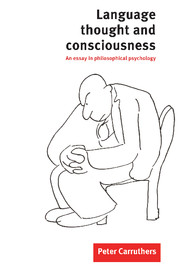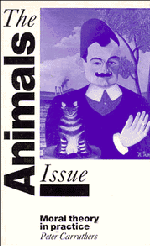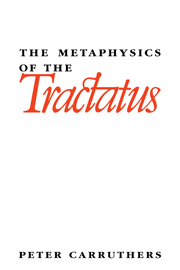The Cognitive Basis of Science
What makes science possible? Specifically, what features of the human mind, of human cognitive development, and of human social arrangements permit and facilitate the conduct of science? The essays in this volume address these questions, which are inherently interdisciplinary, requiring co-operation between philosophers, psychologists, and others in the social and cognitive sciences. They concern the cognitive, social, and motivational underpinnings of scientific reasoning in children and lay persons as well as in professional scientists.
- A volume of interdisciplinary essays
- Current views on a rapidly developing and controversial subject area
- Relevant to current debates about the rationality and objectivity of science
Product details
May 2002Paperback
9780521011778
422 pages
228 × 153 × 27 mm
0.665kg
19 b/w illus. 2 tables
Available
Table of Contents
- 1. Introduction: what makes science possible? Peter Carruthers, Stephen Stich and Michael Siegal
- Part I. Science and Innateness:
- 2. Human evolution and the cognitive basis of science Steven Mithen
- 3. Modular and cultural factors in biological understanding: an experimental approach to the cognitive basis of science Scott Atran
- 4. The roots of scientific reasoning: infancy, modularity, and the art of tracking Peter Carruthers
- Part II. Science and Cognition:
- 5. Science without grammar: scientific reasoning in severe a-grammatic aphasia Rosemary Varley
- 6. Causal maps and Bayes nets: a cognitive and computational account of theory-formation Alison Gopnik and Clark Glymour
- 7. The cognitive basis of model based reasoning in science Nancy Nersessian
- 8. Understanding the role of cognition in science: the Science as Category framework Kevin Dunbar
- 9. Theorizing is important, and collateral information constrains how well it is done Barbara Koslowski and Stephanie Thompson
- 10. The influence of prior belief on scientific thinking Jonathan St B. T. Evans
- 11. Thinking about causality: pragmatic, social and scientific rationality Denis Hilton
- Part III. Science and Motivation:
- 12. The passionate scientist: emotion in scientific cognition Paul Thagard
- 13. Emotions and epistemic evaluations Christopher Hookway
- 14. Social psychology and the theory of science Philip Kitcher
- Part IV. Science and the Social:
- 15. Scientific cognition as distributed cognition Ronald Giere
- 16. The science of childhood Michael Siegal
- 17. What do children learn from testimony? Paul Harris
- 18. The baby in the lab-coat: why child development is an inadequate model for understanding the development of science Luc Faucher, Ron Mallon, Daniel Nazer, Shaun Nichols, Aaron Ruby, Stephen Stich and Jonathan Weinberg.

